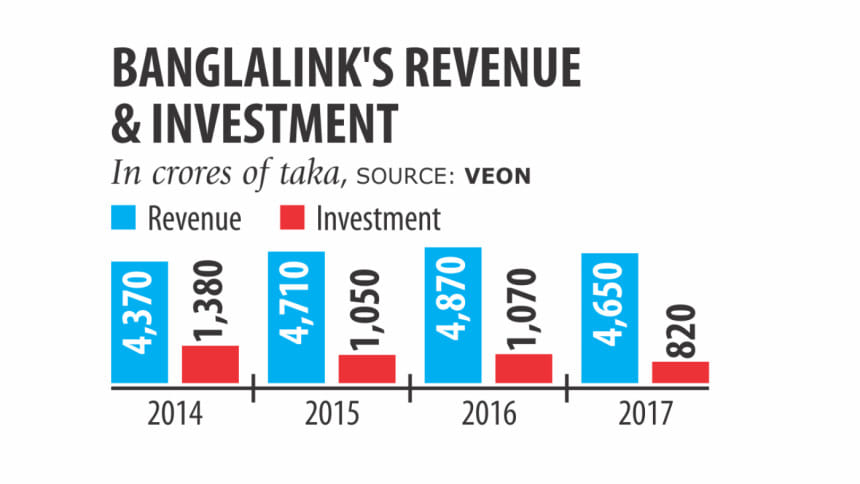Banglalink's revenue shrank in 2017

Banglalink, the country's third largest operator, saw its revenues slip 4.6 percent to Tk 4,650 crore in 2017, in what can be viewed as a worrying development as the country steps into the 4G era.
Veon, the parent company of Banglalink, did not disclose in the annual report for 2017 whether the operator counted profit or loss for the year. Contacted, Banglalink declined to comment on the matter. The operator blamed the results on an exigent fourth quarter, which saw it restore network availability following flooding caused by severe monsoon earlier in the year.
Its competitors Grameenphone and Robi though faced the same challenges in 2017 but navigated the year comparatively better.
Grameenphone's net profit rose 21.4 percent year-on-year to Tk 2,740 crore in 2017 -- the highest in its 21 years of operations in Bangladesh -- while its revenue grew 11.8 percent year-on-year to Tk 12,840 crore.
Robi logged in Tk 6,830 crore as revenue, up 29.7 percent from a year earlier. It counted net losses of Tk 280 crore last year, which is lower than in previous year,
Banglalink also attributed the decline in revenue to the gap in 3G network coverage compared to the market leader and intense price competition in relation to data.
Among all the operators in the country, Banglalink had the least amount of spectrum last year, Erik Aas, chief executive of Banglalink, told The Daily Star yesterday. “We tried our best to ensure quality throughout the year, but some other factors made our task more difficult.”
Though Banglalink's gross revenue declined, its earnings from data increased 28.5 percent year-on-year to Tk 630 crore driven by increased smartphone penetration and a rise in average data consumption of per-internet users.
Active customer base grew 3.2 percent year-on-year to 3.13 crore. The increase was fuelled by competitive customer acquisition campaigns.
At the end of 2017, Banglalink accounted for 22.32 percent of the market share, down from 24.51 percent at the end of 2016.
The operator's investment in 2017 slumped 23.6 percent year-on-year to Tk 820 crore.
But, it started 2018 with substantial investment: it purchased 10.6 Megahertz of spectrum in two different bands and obtained technological neutrality for its entire spectrum for $308.6 million, excluding VAT. It has paid 60 percent for the spectrum charge upfront.
This will allow Banglalink to double its 3G network capacity and expand service quality. In parallel, it acquired a 4G/LTE licence.
“Banglalink addressed the spectrum issue on time,” he said, adding that the newly acquired spectrum has made the operator more capable of providing quality digital services.
“We look forward to making a big turnaround this year,” Aas added.

 For all latest news, follow The Daily Star's Google News channel.
For all latest news, follow The Daily Star's Google News channel. 




Comments